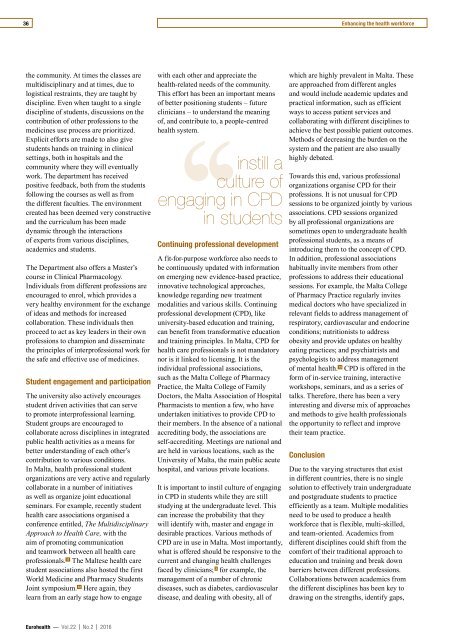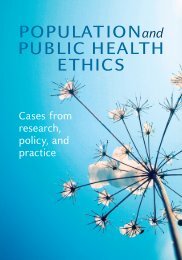EUROHEALTH
Eurohealth-volume22-number2-2016
Eurohealth-volume22-number2-2016
Create successful ePaper yourself
Turn your PDF publications into a flip-book with our unique Google optimized e-Paper software.
36<br />
Enhancing the health workforce<br />
the community. At times the classes are<br />
multidisciplinary and at times, due to<br />
logistical restraints, they are taught by<br />
discipline. Even when taught to a single<br />
discipline of students, discussions on the<br />
contribution of other professions to the<br />
medicines use process are prioritized.<br />
Explicit efforts are made to also give<br />
students hands on training in clinical<br />
settings, both in hospitals and the<br />
community where they will eventually<br />
work. The department has received<br />
positive feedback, both from the students<br />
following the courses as well as from<br />
the different faculties. The environment<br />
created has been deemed very constructive<br />
and the curriculum has been made<br />
dynamic through the interactions<br />
of experts from various disciplines,<br />
academics and students.<br />
The Department also offers a Master’s<br />
course in Clinical Pharmacology.<br />
Individuals from different professions are<br />
encouraged to enrol, which provides a<br />
very healthy environment for the exchange<br />
of ideas and methods for increased<br />
collaboration. These individuals then<br />
proceed to act as key leaders in their own<br />
professions to champion and disseminate<br />
the principles of interprofessional work for<br />
the safe and effective use of medicines.<br />
Student engagement and participation<br />
The university also actively encourages<br />
student driven activities that can serve<br />
to promote interprofessional learning.<br />
Student groups are encouraged to<br />
collaborate across disciplines in integrated<br />
public health activities as a means for<br />
better understanding of each other’s<br />
contribution to various conditions.<br />
In Malta, health professional student<br />
organizations are very active and regularly<br />
collaborate in a number of initiatives<br />
as well as organize joint educational<br />
seminars. For example, recently student<br />
health care associations organised a<br />
conference entitled, The Multidisciplinary<br />
Approach to Health Care, with the<br />
aim of promoting communication<br />
and teamwork between all health care<br />
professionals. 11 The Maltese health care<br />
student associations also hosted the first<br />
World Medicine and Pharmacy Students<br />
Joint symposium. 12 Here again, they<br />
learn from an early stage how to engage<br />
with each other and appreciate the<br />
health-related needs of the community.<br />
This effort has been an important means<br />
of better positioning students – future<br />
clinicians – to understand the meaning<br />
of, and contribute to, a people-centred<br />
health system.<br />
a<br />
culture of<br />
engaging CPD<br />
students<br />
Continuing ‘‘instill<br />
professional development<br />
A fit-for-purpose workforce also needs to<br />
be continuously updated with information<br />
on emerging new evidence-based practice,<br />
innovative technological approaches,<br />
knowledge regarding new treatment<br />
modalities and various skills. Continuing<br />
professional development (CPD), like<br />
university-based education and training,<br />
can benefit from transformative education<br />
and training principles. In Malta, CPD for<br />
health care professionals is not mandatory<br />
nor is it linked to licensing. It is the<br />
individual professional associations,<br />
such as the Malta College of Pharmacy<br />
Practice, the Malta College of Family<br />
Doctors, the Malta Association of Hospital<br />
Pharmacists to mention a few, who have<br />
undertaken initiatives to provide CPD to<br />
their members. In the absence of a national<br />
accrediting body, the associations are<br />
self-accrediting. Meetings are national and<br />
are held in various locations, such as the<br />
University of Malta, the main public acute<br />
hospital, and various private locations.<br />
It is important to instil culture of engaging<br />
in CPD in students while they are still<br />
studying at the undergraduate level. This<br />
can increase the probability that they<br />
will identify with, master and engage in<br />
desirable practices. Various methods of<br />
CPD are in use in Malta. Most importantly,<br />
what is offered should be responsive to the<br />
current and changing health challenges<br />
faced by clinicians; 3 for example, the<br />
management of a number of chronic<br />
diseases, such as diabetes, cardiovascular<br />
disease, and dealing with obesity, all of<br />
which are highly prevalent in Malta. These<br />
are approached from different angles<br />
and would include academic updates and<br />
practical information, such as efficient<br />
ways to access patient services and<br />
collaborating with different disciplines to<br />
achieve the best possible patient outcomes.<br />
Methods of decreasing the burden on the<br />
system and the patient are also usually<br />
highly debated.<br />
Towards this end, various professional<br />
organizations organise CPD for their<br />
professions. It is not unusual for CPD<br />
sessions to be organized jointly by various<br />
associations. CPD sessions organized<br />
by all professional organizations are<br />
sometimes open to undergraduate health<br />
professional students, as a means of<br />
introducing them to the concept of CPD.<br />
In addition, professional associations<br />
habitually invite members from other<br />
professions to address their educational<br />
sessions. For example, the Malta College<br />
of Pharmacy Practice regularly invites<br />
medical doctors who have specialized in<br />
relevant fields to address management of<br />
respiratory, cardiovascular and endocrine<br />
conditions; nutritionists to address<br />
obesity and provide updates on healthy<br />
eating practices; and psychiatrists and<br />
psychologists to address management<br />
of mental health. 13 CPD is offered in the<br />
form of in-service training, interactive<br />
workshops, seminars, and as a series of<br />
talks. Therefore, there has been a very<br />
interesting and diverse mix of approaches<br />
and methods to give health professionals<br />
the opportunity to reflect and improve<br />
their team practice.<br />
Conclusion<br />
Due to the varying structures that exist<br />
in different countries, there is no single<br />
solution to effectively train undergraduate<br />
and postgraduate students to practice<br />
efficiently as a team. Multiple modalities<br />
need to be used to produce a health<br />
workforce that is flexible, multi-skilled,<br />
and team-oriented. Academics from<br />
different disciplines could shift from the<br />
comfort of their traditional approach to<br />
education and training and break down<br />
barriers between different professions.<br />
Collaborations between academics from<br />
the different disciplines has been key to<br />
drawing on the strengths, identify gaps,<br />
Eurohealth — Vol.22 | No.2 | 2016
















